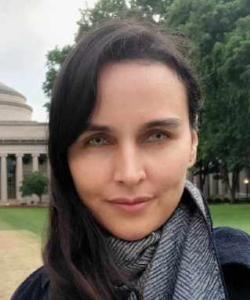Neuroscientist Nicole Edwards (Ngāi Tahu, Ngāti Kahungunu) has barely been home three months, and she has hit the ground running with the task of establishing her own research lab in the School of Biological Science at Waipapa Taumata Rau.
Nicole is a Fulbright Science and Innovation recipient and recently returned from her mahi at the Broad Institute of MIT and Harvard where part of her work looked at new genomic technologies to identify how brain and immune cells dynamically respond to each other and their environment at a genetic level.
She says genomics research has the potential to help understand the dynamics of development and disease progression and this is one strand of research she intends progressing in her lab. “The emergence of these next generation sequencing technologies is a powerful means to gain high resolution insight into the complex mechanisms underlying disease. Given the fraught history of genetic research and Indigenous communities, it is also an opportunity to question how we might best utilise next generation genomics tools without creating more inequity,” she says.
As a developmental neurobiologist by training, she is excited by this technology’s potential to uncover new insights into fundamental cell biology and improve understanding of both neurodevelopment and age-related neurological degenerative conditions such as Mate Wareware (Alzheimer’s), which will be another strand of her research plan.
“There is so much that we don’t know. Genomics and new sequencing technologies are powerful tools to help us understand the drivers of disease. So, once we understand what’s happening at a fundamental genetic level, in a cell-specific way, we can develop treatments from there. Genomics is only one tool in a huge research landscape – you need people looking at it from many different angles in lots of different areas”.
She says when she was in the USA, there was a growing recognition that there is a lack of diversity in genetic datasets which largely represent those of European ancestry, with less than 1% being Indigenous. There is therefore a significant gap in our knowledge about other genetically diverse people. Nicole believes it is important to update our body of knowledge to ensure it is inclusive and representative. It is also important that this is done appropriately if we are to include Māori and Pacifika in research, which she hopes to do.
Another important aspect of her research therefore needs to encompass data sovereignty to ensure participant data is safeguarded.
“The new generation of genetic sequencing tools are cutting edge and I’m hoping to use them here. However, if I want to involve our communities in my research, it’s important to work in an ethical and culturally responsive way that safeguards the rights and interests of participants.”
Before Nicole finalises her research strategy, she is trying to better understand the Indigenous data landscape and is looking at issues such as who controls data, who holds it and who can access it in the future. “It’s a tricky area, but it is important in the early stages of setting up my lab to do everything properly and that includes maintaining Māori data sovereignty principles. If we can develop the right tools that are safe for us, then we are enabling Māori more choices and removing barriers of access to better health outcomes. Ensuring that Māori are present throughout the entire lifecycle of the data is important. However, it is not simply a case of putting more Māori in the room, but making sure the room is fit for purpose,” she says.
After establishing her research plan and securing funding, Nicole will begin lecturing next year. Eventually she will be bringing her own students into the lab. She says it’s important to nurture future early career researchers (ECRs), and she is hoping to create a rōpū of Māori neuroscience ECRs who will feel more supported in their research journey in what might otherwise be an isolating environment.
One of the many positive aspects of studying in the USA was the tautoko she felt from other Māori. “There was an amazing community of Māori at MIT and Harvard who were not only achieving at the highest level, but who were also empowering each other to excel and uplift everyone around them. I didn’t realise how much I needed that support from a community with shared values until I experienced it there. It can be quite isolating when you are the only Māori working in an academic arena.”
Nicole says there is a lot to love about neuroscience and she encourages other Māori with an interest in health to explore the area. “It is kind of like the last frontier. There is so much we don’t know about the brain and how it works. The answer is probably not in one cell – but it is part of the story. It’s a beautiful mystery. The brain is a great example of a dynamic ecosystem, or a super-city built on relationships. That mystery of what makes us fundamentally us is fascinating to me.”
